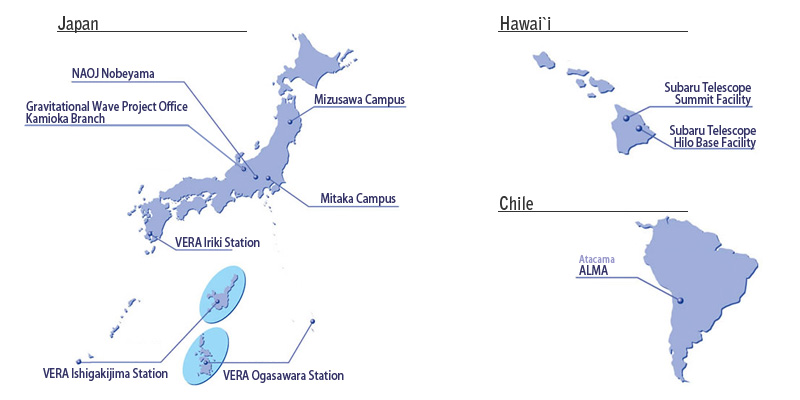- Home
- About:
- Campus and Observatories
Campuses and Observatories
The campuses of Astronomical Science Program are NAOJ campuses and NAOJ observatories. NAOJ offers astronomers nationwide joint usage of research facilities including observational facilities such as the Subaru Telescope and NAOJ Nobeyama radio telescopes, as well as supercomputers. The domestic campuses are Mitaka Campus, NAOJ Nobeyama, Mizusawa Campus, the Gravitational Wave Project Office Kamioka Branch, and the VERA Stations. However, our campuses are not just in Japan. We also have the Subaru Telescope in Hawai`i and ALMA in Chile. Many faculty members belonging to the Astronomical Science Program stay there long-term for research and engage in education in the Astronomical Science Program.

Campuses and Observatories
- Mitaka Campus
- Subaru Telescope
- NAOJ Chile
- NAOJ Nobeyama
- Mizusawa Campus
- Gravitational Wave Project Office Kamioka Branch
- The seven VLBI Stations
Mitaka Campus
Mitaka Campus is the headquarters of NAOJ (National Astronomical Observatory of Japan) in Mitaka, Tokyo. Our institute promotes astronomical research in Japan and holds regular events and open campus as an open research institute.
Address: 2-21-1 Osawa, Mitaka, Tokyo, 181-8588, JAPAN
Subaru Telescope
Subaru Telescope consists of the Summit Facility near the summit of Maunakea at an altitude of 4,200 m and the Hiro Base Facility where research projects, development, and administration are conducted.
Hilo Base Facility
Address: 650 North A`ohoku Place, Hilo, Hawai`i 96720 U.S.A.
(Note.) There is no public transportation to the Hilo Base Facility.
NAOJ Chile
ALMA is a giant radio telescope which was constructed in Chile in cooperation with the Republic of Chile, through global partnership of East Asia, North America, and the member states of the European Organization for Astronomical Research in the Southern Hemisphere (ESO). ALMA is an array of 66 antennas (composed of 12-m and 7-m antennas in diameter) designed to observe astronomical objects at millimeter/submillimeter wavelength, which is at the shortest wavelength range in the radio wave spectrum. NAOJ Chile is focused on the mission to manage and oversee the NAOJ researchers working for the Joint ALMA Observatory (JAO) and to facilitate the on-site operations of ALMA in Chile.
NAOJ Nobeyama
NAOJ Nobeyama is located in the Nobeyama highlands in Nagano. Leading-edge observational instruments, including the Nobeyama 45-m Radio Telescope, the Nobeyama Millimeter Array, and the Nobeyama Radioheliograph have been established here to pursue various research themes related to the Universe.
Address: Nobeyama, Minamimakimura, Minamisaku, Nagano 384-1305, Japan
Mizusawa Campus
The RISE Project and Mizusawa VLBI Observatory, which includes multiple projects, are involved in research activities at Mizusawa Campus.
Address: 2-12, Hoshigaoka, Mizusawa, Oshu, Iwate 023-0861, Japan
Gravitational Wave Project Office Kamioka Branch
The gravitational wave detector KAGRA is now undergoing upgrades in the town of Kamioka in Hida City, Gifu Prefecture, where the Kamioka Branch is located. Once the upgrades are completed, KAGRA will observe gravitational waves emitted from high energy astronomical events such as collisions of black holes in coordination with other large gravitational wave detectors around the world to extend our understanding of the Universe.
Address: 238 Higashimozumi, Kamioka-cho, Hida, Gifu, 506-1205, Japan
The 6 VLBI Stations
- VERA Mizusawa Station
Address: 2-12, Hoshigaoka, Mizusawa, Oshu, Iwate 023-0861, Japan - Ibaraki Station
Address: 608-1, Ishitaki, Takahagi, Ibaraki 318-0022, Japan - Yamaguchi Station
Address: 123, Nihonakago, Yamaguchi, Yamaguchi 753-0302, Japan - VERA Iriki Station
Address: 4018-3, Uranomyo, Iriki, Satsumasendai, Kagoshima 895-1402, Japan - VERA Ogasawara Station
Address: Asahiyama, Chichi-jima, Ogasawara, Tokyo 100-2101, Japan - VERA Ishigakijima Station
Address: 2389-1, Tonoshirotakeda, Ishigaki, Okinawa 907-0004, Japan

